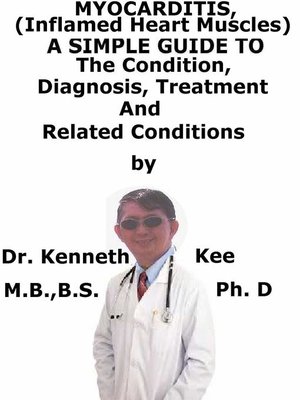Myocarditis, (Inflamed Heart Muscles) a Simple Guide to the Condition, Diagnosis, Treatment and Related Conditions
ebook
By Kenneth Kee

Sign up to save your library
With an OverDrive account, you can save your favorite libraries for at-a-glance information about availability. Find out more about OverDrive accounts.
Find this title in Libby, the library reading app by OverDrive.



Search for a digital library with this title
Title found at these libraries:
| Loading... |
Recently there have been several cases of young persons such as national service men or young runners who suddenly collapsed and died of a heart attack.Very often these people had a viral infection (e.g., influenza) a few days or 1 week before they started on their strenuous physical activity.A viral infection can often cause inflammation of the heart muscles a condition called myocarditis which can lead to sudden heart attack and death.It is very important to get sufficient rest after a viral infection such as influenza before starting on any strenuous physical exercise.Myocarditis is acute or chronic inflammation of the heart muscle due to reaction of living tissue to injury or infection.The inflammation may affect parts of the heart muscle or the whole heartIt may present similarly to myocardial infarction.Myocardial destruction may lead to dilated cardiomyopathyCauses1.Infection:Most of the time, it is caused by an infection that reaches the heartThe chemicals made by these disease fighting cells can also damage the heart muscle.Consequently, the heart can become thick, swollen, and weak.Many cases are caused by a virus that reaches the heart.2.Immune-mediated diseases (body defending system attacks the body's healthy tissues):Autoimmune disorders that cause inflammation throughout the body such as:Sarcoidosis.Systemic lupus erythematosus.Scleroderma3.Drugs causing hypersensitivity reactions4.Heavy metal poisoning: lead, copper, iron5.Physical agents: Electric shock, Hyperpyrexia, Radiation or radiotherapyIn developed countries, the most frequent causes are hypersensitivity or allergic reactionsSymptomsThere may be no symptoms.Symptoms may be similar to the fluECG abnormalitiesHeart failureLeft ventricular dysfunction (LVD)FatigueChest painFever and other signs of infectionJoint or leg swellingDyspneaPalpitationsFaintingSudden DeathDiagnosis:Myocarditis can be hard to diagnose because the signs and symptoms often imitate those of other heart and lung diseasesThe doctor may hear a very fast heartbeat or unusual heart soundsA chest x-ray can reveal swelling or enlargement of the heart.If the doctor suspects myocarditis based on the examination and chest x-ray, an electrocardiogram may also be done to help make the diagnosis.Other tests that may be needed are:1. Blood cultures to check for infection2. Blood tests to look for antibodies against viruses or the heart muscle itself3. Blood tests to check liver and kidney functionInvestigationsECG: changes may include ST-segment elevation/depression, T-wave inversion, atrial arrhythmias, transient atrioventricular (AV) block.CXR: Normal cardiac silhouette but pericarditis or overt clinical congestive heart failure is linked with cardiomegaly.Vascular redistribution.Interstitial and alveolar edema.Pleural effusion.Heart biopsy (the most accurate way to confirm the diagnosis)Cardiac CT scan and MRIEchocardiographyCardiac catherizationTreatment:Treatment of myocarditis is dependent on the severity and the underlying cause.For most patients, no treatment is needed except for a few days of adequate rest if the symptoms are mild.Patients with signs of acute myocarditis (fever, WCC, flu-like illness and hemodynamic compromise) should be transferred to ICU, as ventricular support and oxygen support may become necessary.Patients may heal or continue to intractable heart failureSteroids have been shown to improve survival in giant cell myocarditisParenteral inotropes (e.g., milrinone) or adrenergic agonistsAnticoagulantRest after recovery from acute myocarditisArtificial heart implantsHeart transplant may be neededTABLE OF CONTENTIntroductionChapter 1 MyocarditisChapter 2 CausesChapter 3 SymptomsChapter 4 DiagnosisChapter 5 TreatmentChapter...






